Introduction
In the dynamic landscape of small and medium businesses (SMBs), the role of IT support has evolved into a critical component for achieving operational success and competitive advantage. As these organizations navigate the complexities of technology management, they often rely on external providers to deliver essential services that ensure their systems run smoothly and securely.
From proactive managed IT services to robust cybersecurity measures, the breadth of support available is designed to address the unique challenges faced by SMBs. This article delves into the various facets of IT support, exploring its significance, the essentials of cybersecurity, the process of selecting the right provider, the transformative impact of cloud computing, and emerging trends that will shape the future of IT support for SMBs.
Understanding these elements is vital for organizations aiming to harness technology as a catalyst for innovation and growth in an increasingly digital world.
Understanding IT Support for Small and Medium Businesses
Small medium business IT support includes a variety of offerings designed to help these organizations efficiently handle their technological infrastructure. In contrast to bigger companies that usually possess specialized IT teams, many small medium businesses rely on external providers for IT support to offer essential functions, including:
- Network management
- Hardware and software assistance
- Help desk aid
This support is essential for maintaining operational efficiency and minimizing downtime, both of which can significantly influence overall business performance.
Among the key offerings provided, managed IT solutions stand out. These solutions adopt a proactive approach to consistently monitor and maintain IT systems, ensuring that potential issues are addressed before they escalate. The managed services sector shows substantial growth potential from 2022 to 2032, reflecting the increasing reliance on these services for critical operations.
Help desk support is another crucial offering, providing immediate assistance for technical problems, thus enabling employees to remain productive. Furthermore, SMBs gain substantial advantages from strategic IT consulting, which assists them in aligning technology initiatives with their overarching organizational goals. This alignment enables the optimization of technology investments and the implementation of scalable solutions that can develop alongside the organization.
The significance of IT assistance is highlighted by the fact that nearly half of small enterprises spend less than $1,500 monthly on cybersecurity, indicating a considerable opportunity for enhancement in protecting their operations. Furthermore, with forecasts indicating that 70% of the global workforce will operate remotely at least five days each month by 2025 (Global Workplace Analytics), the need for strong IT assistance services is more urgent than ever. Consequently, efficient small medium business IT support not only allows small and medium-sized businesses to focus on their essential operations but also enables them to utilize technology as a driver for innovation and competitive edge.
Moreover, insights from the case study titled 'Marketing Goals of Small Enterprises Owners' reveal that:
- 31% of small enterprises owners identify driving sales as their top marketing goal
- Customer retention
- Brand awareness
This emphasizes the essential role that small medium business IT support plays in helping small and medium-sized businesses achieve these objectives, as a strong IT infrastructure can enable improved customer engagement and operational efficiency.
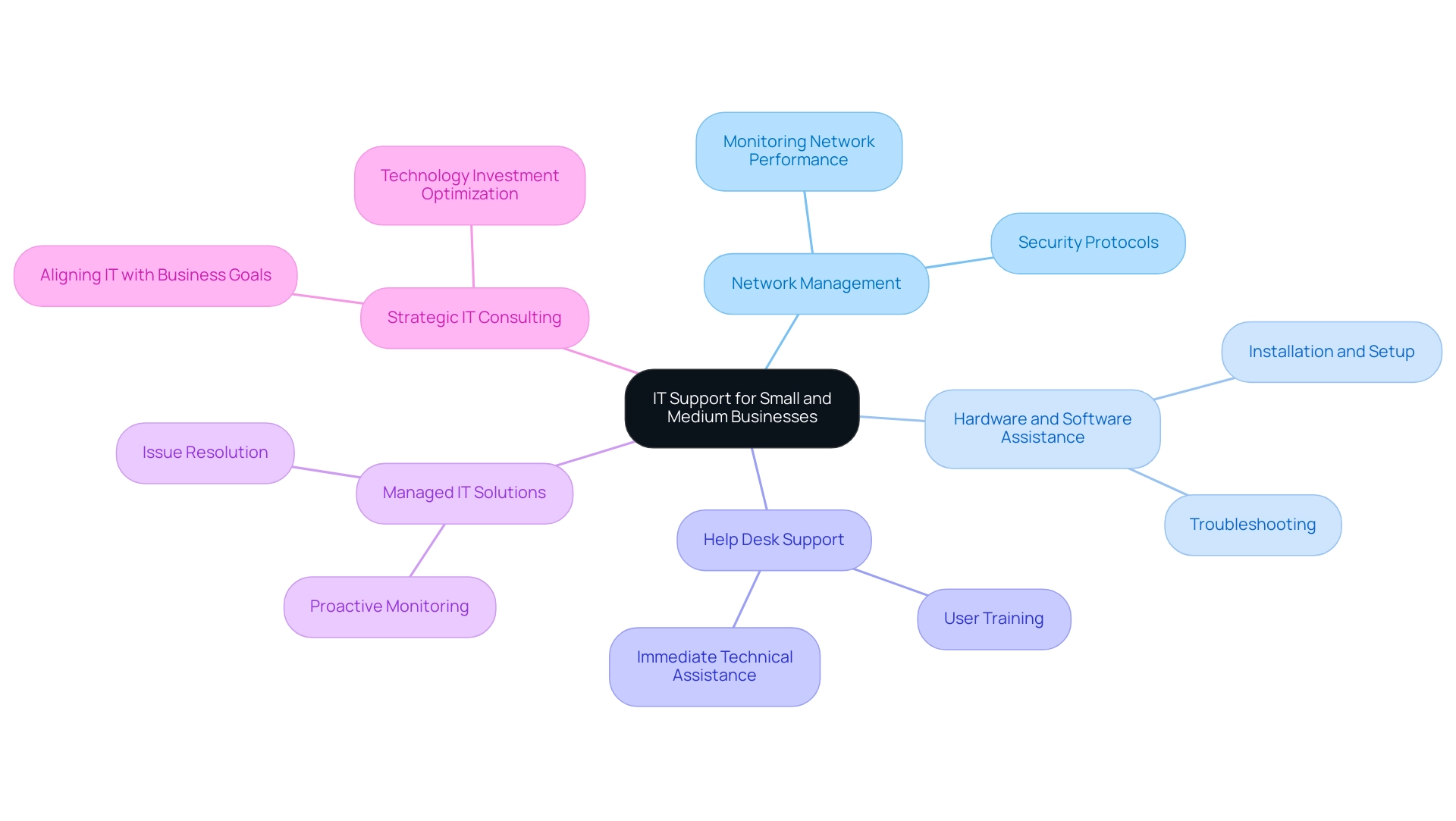
Cybersecurity Essentials for SMB IT Support
Cybersecurity continues to be a vital issue for small and medium enterprises, especially considering that 20% of organizations faced security breaches linked to remote employees during the pandemic. The reality is that small and medium-sized businesses often require strong small medium business IT support due to their perceived vulnerabilities, making robust cybersecurity strategies essential.
Key essentials for effective cybersecurity include:
- The implementation of advanced firewalls
- Reliable antivirus software
- Regular system updates to guard against malware and unauthorized access
Additionally, employee training is vital; equipping staff with skills to recognize phishing attempts and adhere to safe online practices is essential, as human error is a leading contributor to cybersecurity incidents. Incident response plans must also be prioritized to ensure business continuity in the face of cyberattacks.
Investment in data backup solutions is crucial, as evidenced by the statistic that 87% of small businesses hold customer data susceptible to cyberattacks, which can lead to identity theft and privacy violations.
With global cybersecurity spending projected to reach $1.75 trillion from 2021 to 2025, it is clear that prioritizing cybersecurity is not merely a compliance issue but a strategic imperative.
Furthermore, as the Bureau of Labor Statistics notes, the job market for computer programmers is expected to decline, underscoring the need for specialized expertise in cybersecurity—a vital area for small and medium-sized businesses. By embedding robust cybersecurity measures within their IT framework, small and medium-sized businesses can rely on small medium business IT support to safeguard their assets, maintain regulatory compliance, and cultivate customer trust—factors that are integral to thriving in an evolving digital landscape. For NinjaOne customers, it’s important to remember that the use of scripts is subject to the applicable End User License Agreement (EULA), which further emphasizes the need for compliance and security in their operations.
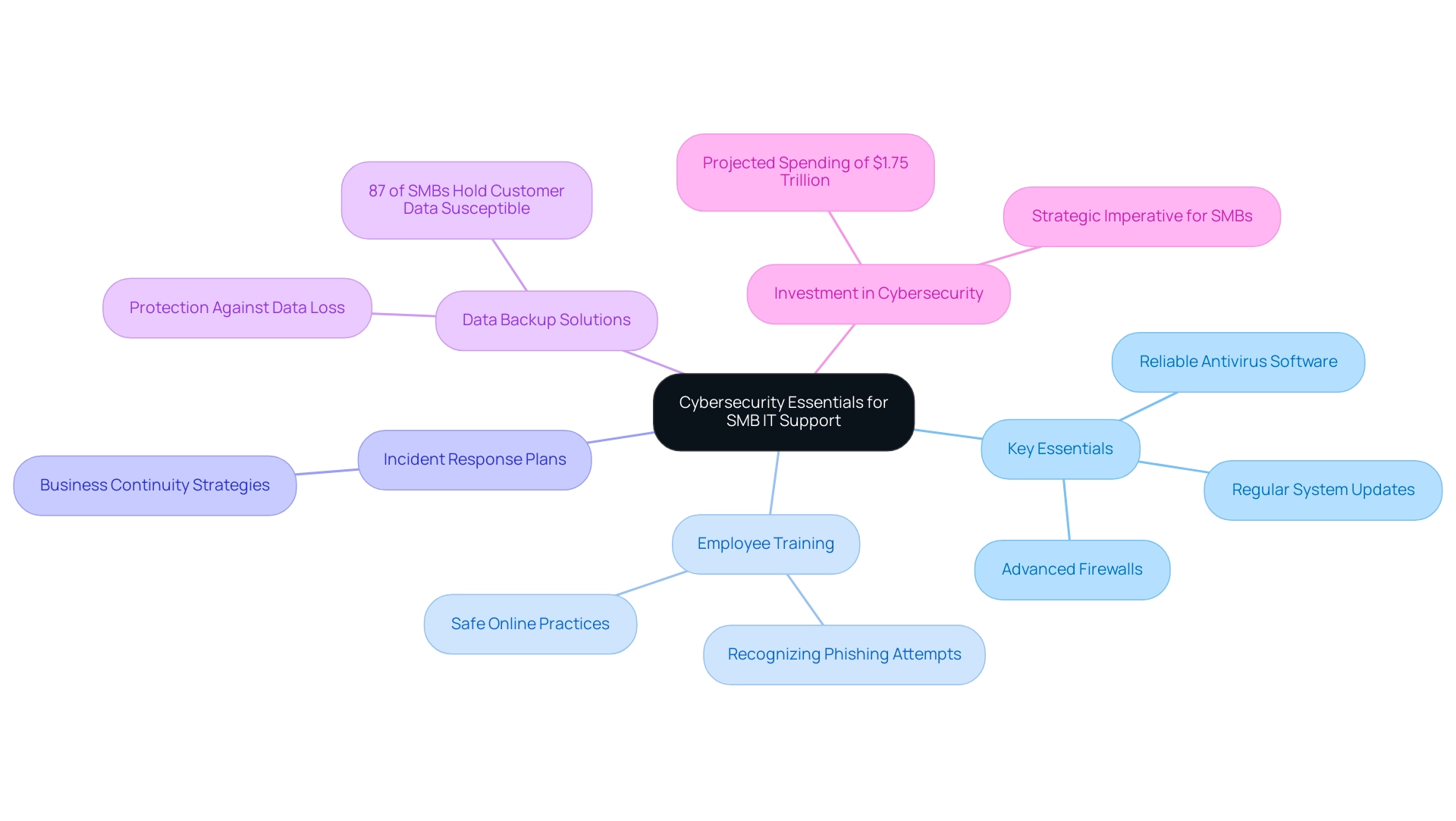
Choosing the Right IT Support Provider
Choosing the right small medium business IT support provider is a crucial decision for small and medium enterprises, as it significantly affects operational efficiency and overall success. In the process of evaluating potential partners, SMBs should focus on several critical factors:
-
Experience and Expertise: It is essential for providers to possess a proven track record within the SMB sector, showcasing their understanding of the unique challenges that these businesses encounter. As one client noted, "STS Consulting Group was the missing piece to my puzzle. From start to finish, they solved every problem and helped us achieve our goals in the most professional way possible."
-
Offerings: A robust array of solutions, encompassing managed IT, cybersecurity, and cloud options, is vital to cater to the diverse requirements of SMBs. Clients have shared how these offerings have consistently exceeded their expectations. For instance, another client expressed, "Using STS Consulting Group helped me save weeks of work. Their delightful level of quality and service is consistent and one of a kind."
-
Scalability: The chosen provider should deliver scalable solutions that adjust with business growth, ensuring IT assistance stays aligned with changing objectives.
-
Customer Assistance: Efficient and responsive customer assistance is indispensable for promptly addressing technical issues and minimizing downtime. Client feedback reinforces the importance of this aspect, with many praising the team's helpfulness and knowledge.
-
Reputation and Reviews: Conducting thorough research on client testimonials and case studies offers valuable insights into the provider's reliability and service quality. The testimonials provided by our clients unequivocally showcase STS Consulting Group's commitment to excellence.
-
Cultural Fit and Communication Styles: Assessing the cultural fit and communication styles of potential providers is crucial for establishing a good relationship, ensuring that both parties can collaborate effectively.
Additionally, organizations often struggle with managing IT spending, making it essential to choose a provider that can uncover cost-saving opportunities. This emphasizes the significance of choosing the right IT assistance provider to navigate these challenges successfully.
By meticulously assessing these criteria, small and medium-sized businesses can find small medium business IT support that not only meets their immediate requirements but also encourages future growth and innovation. As noted by Nionila Ivanova, founder of IT Creative Labs, "Otherwise, here are five steps you can take to vet your technology partner organization," emphasizing the significance of a structured selection process in making this critical decision.
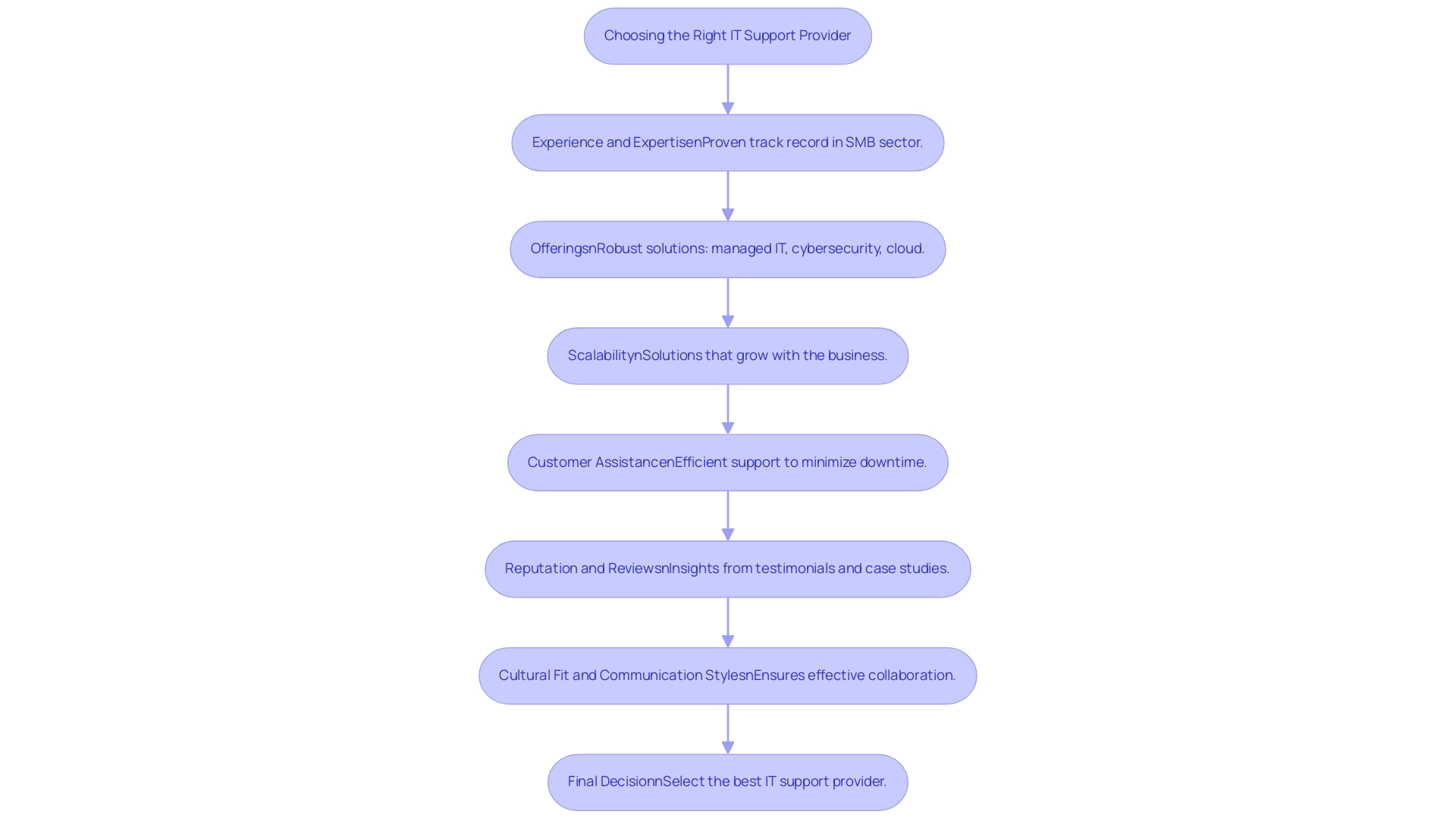
The Role of Cloud Computing in SMB IT Support
Cloud computing has emerged as a pivotal solution for small medium business IT support, enabling them to access cutting-edge IT resources without the burden of substantial upfront investments in infrastructure. This technology not only supports operational agility but also drives significant cost savings. As Synergy Research Group notes, "CloudFlare and Akamai also show up in the Content Distribution Network (CDN) space," highlighting the competitive landscape of cloud services.
The following benefits illustrate how cloud computing enhances the operational capabilities of SMBs:
- Scalability: Cloud solutions empower businesses to seamlessly adjust their IT resources in response to fluctuating demand, ensuring they only pay for what they utilize. This flexibility is particularly crucial as the anticipated global data storage is projected to reach 200 zettabytes by 2025, emphasizing the need for adaptable solutions to manage this data effectively.
- Cost Efficiency: Adopting cloud computing provides small medium business IT support, allowing them to minimize expenses related to hardware maintenance and software licensing. Many cloud services operate on a subscription basis, which significantly reduces the financial burden traditionally associated with IT infrastructure.
- Accessibility: With cloud-based applications, employees can access essential data and tools from virtually anywhere. This capability not only enhances collaboration but also supports remote work initiatives, which are increasingly vital in today’s corporate landscape.
- Enhanced Security: Leading cloud providers implement advanced security measures, such as data encryption and routine backups, ensuring that small medium business IT support can effectively protect their sensitive information.
As organizations increasingly embrace cloud computing, it is crucial for them to adopt efficient cloud operating models to remain competitive and responsive in a rapidly evolving market. According to the case study titled 'The Future of Cloud Computing,' as cloud computing becomes essential for organizations, it will facilitate innovation and enhance connectivity and analysis capabilities. By leveraging cloud services, small medium business IT support can help enhance operational efficiency and realize a competitive advantage in their respective industries.
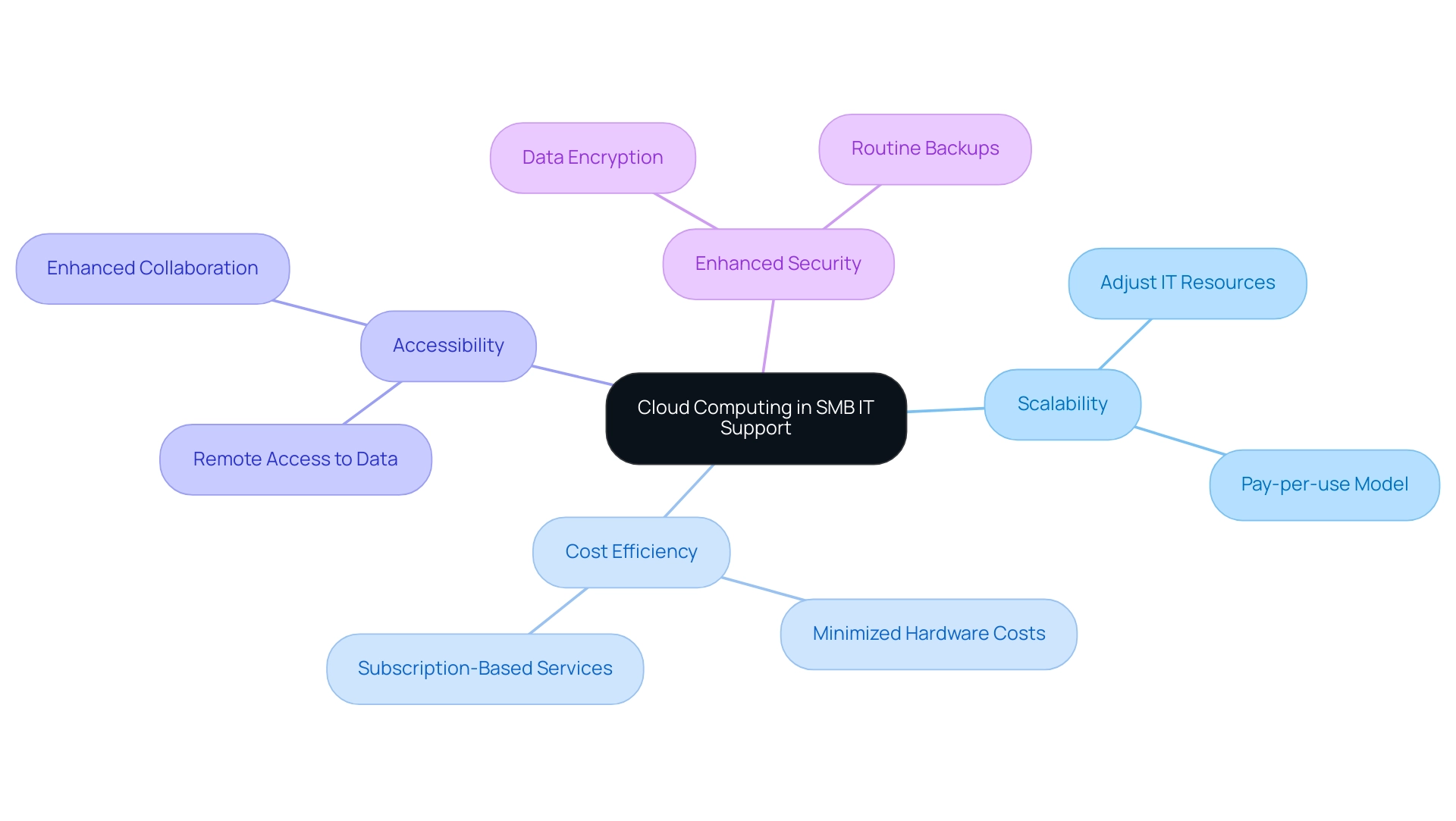
Future Trends in SMB IT Support
As technology keeps advancing quickly, small and medium enterprises (SMEs) must stay alert about upcoming trends in small medium business IT support to preserve a competitive advantage. Key trends to monitor include:
- Increased Automation: Automation tools are set to play an increasingly pivotal role in IT support, streamlining processes and significantly reducing the necessity for manual intervention.
This shift not only enhances efficiency but also allows IT teams to focus on more strategic tasks. For instance, studies indicate that companies implementing automation can reduce operational costs by up to 30%.
- AI and Machine Learning: The integration of artificial intelligence and machine learning technologies is poised to transform cybersecurity measures and elevate data analysis capabilities.
This advancement enables small medium business IT support to help SMBs make more informed, data-driven decisions, bolstering their security posture in a landscape where nearly half of all cyberattacks target small businesses. According to recent reports, this statistic highlights the urgent need for robust cybersecurity measures in small medium business IT support frameworks.
- Remote Work Solutions: The ongoing trend toward remote work necessitates robust IT support that enables secure remote access and collaboration.
As businesses continue to adapt to this model, the demand for innovative solutions that facilitate seamless communication and productivity will only grow. In fact, the global QR code payment market is projected to reach USD 11.67B in 2024, growing at a CAGR of 16.9%, highlighting the increasing relevance of payment technologies in supporting remote work environments.
- Focus on Sustainability: Small and medium-sized businesses are increasingly prioritizing sustainable IT practices, adopting solutions that not only optimize resource use but also minimize environmental impact.
This increasing dedication to sustainability mirrors wider societal values and can improve brand reputation.
Monitoring these trends closely will enable small medium business IT support to strategically adjust their IT frameworks, ensuring they are well-positioned to leverage these technological advancements for future growth and innovation. As McCabe aptly notes,
Your vendor should always have transparent pricing, with a contract that doesn’t leave room for surprises.
For instance, companies like Adjourn Teahouse, supported by resources from WareSpace, have thrived by embracing tailored IT solutions that meet their unique needs.
This case exemplifies how proactive IT support can drive business success in an increasingly automated and competitive environment.
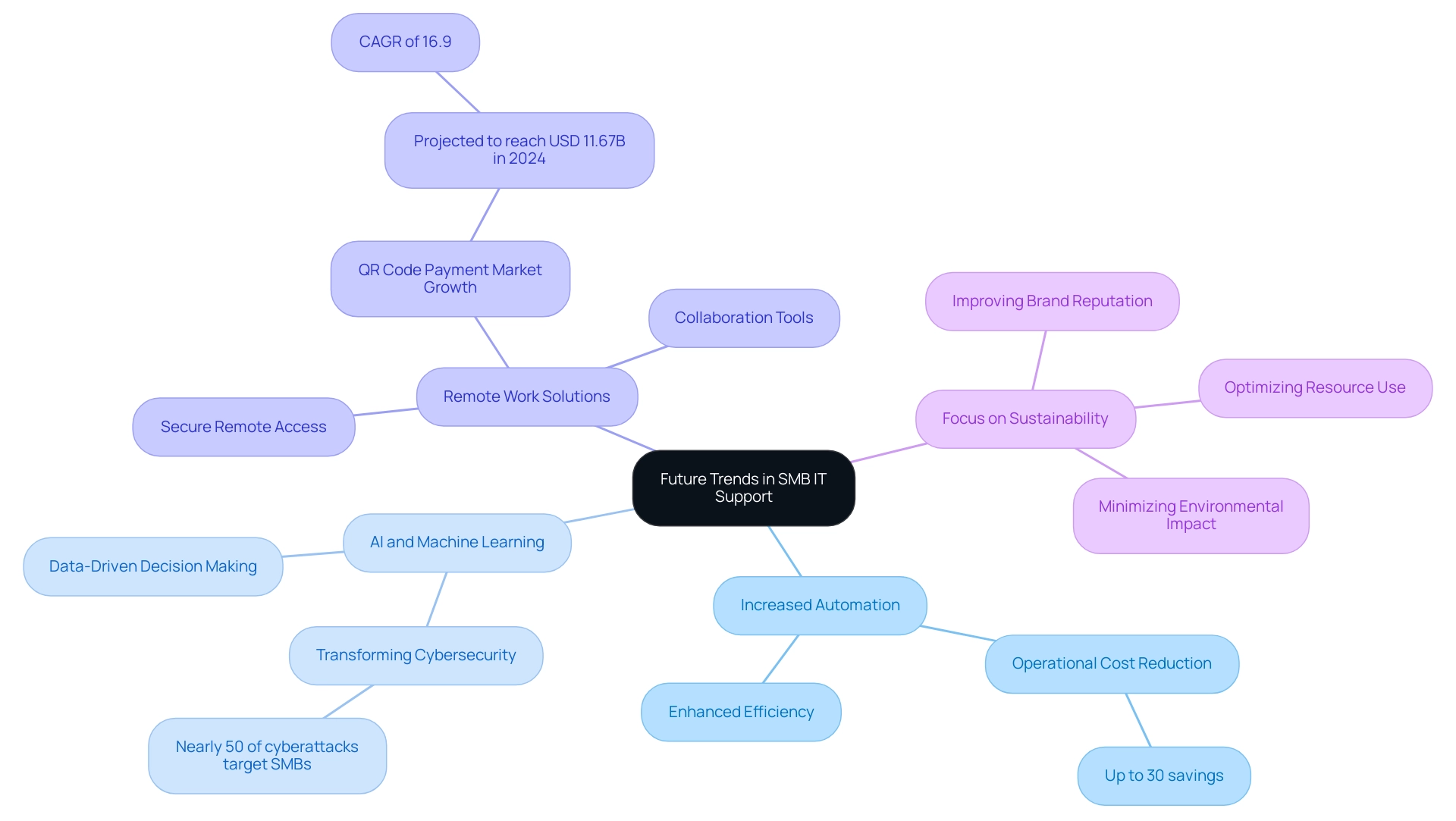
Conclusion
In the ever-evolving landscape of small and medium businesses (SMBs), effective IT support emerges as a cornerstone for operational success and innovation. As highlighted throughout this article, the array of services available—from managed IT and cybersecurity to cloud computing—empowers SMBs to navigate the complexities of technology management while enhancing their competitive edge. The proactive nature of managed IT services ensures that potential issues are swiftly addressed, minimizing downtime and fostering productivity.
Cybersecurity remains a paramount concern, particularly as SMBs face increasing threats in a digital world. By implementing robust cybersecurity measures and investing in employee training, organizations can protect their assets and maintain customer trust. Furthermore, selecting the right IT support provider is crucial; businesses must evaluate:
- Experience
- Service offerings
- Scalability
- Customer support
to ensure alignment with their unique needs and growth aspirations.
Cloud computing stands out as a transformative force, offering scalability, cost efficiency, and enhanced security. As organizations leverage cloud solutions, they not only streamline operations but also position themselves for future success in a data-driven environment. Moreover, staying attuned to emerging trends—such as automation, AI integration, and a focus on sustainability—will be vital for SMBs aiming to remain competitive and responsive to market demands.
Ultimately, embracing comprehensive IT support is not merely a tactical decision; it is a strategic imperative that can unlock innovation and drive long-term growth. By harnessing technology effectively, SMBs can navigate challenges, seize opportunities, and thrive in an increasingly digital world.




